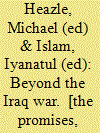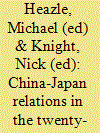|
|
|
Sort Order |
|
|
|
Items / Page
|
|
|
|
|
|
|
| Srl | Item |
| 1 |
ID:
075170


|
|
|
|
|
| Publication |
Cheltenham, Edward Elgar Publishing Limited, 2006.
|
| Description |
xiii, 190p.
|
| Standard Number |
1845426320
|
|
|
|
|
|
|
|
|
|
|
|
Copies: C:1/I:0,R:0,Q:0
Circulation
| Accession# | Call# | Current Location | Status | Policy | Location |
| 051917 | 327.73056700905/HEA 051917 | Main | On Shelf | General | |
|
|
|
|
| 2 |
ID:
079507


|
|
|
|
|
| Publication |
Cheltenham, Edward Elgar, 2007.
|
| Description |
xi, 247p.
|
| Standard Number |
9781847201126
|
|
|
|
|
|
|
|
|
|
|
|
Copies: C:1/I:0,R:0,Q:0
Circulation
| Accession# | Call# | Current Location | Status | Policy | Location |
| 052882 | 303.48251052/HEA 052882 | Main | On Shelf | General | |
|
|
|
|
| 3 |
ID:
160008


|
|
|
|
|
| Summary/Abstract |
In this paper, we assess the drivers of, and prospects for, further security cooperation in the Australia–Japan bilateral relationship. We argue that while balance of threat and capability gaps may restrain the pace of deepening Australian-Japan security relations, these gaps are diminishing and are, in any case, secondary to the specific shared interests we posit as the primary drivers of Australia–Japan security cooperation. These specific interests, however, are shaped not only by a commitment in both countries to liberal-based principles and freedoms at home and in inter-state relations, but also by a common awareness of the importance of continued US primacy to the ongoing maintenance of those interests. Thus, in the absence of any fundamental change in how Australia and Japan understand their respective interests and the US role in the region, Donald Trump's recent and unexpected election as US president notwithstanding, we conclude that the case for further security cooperation – via additional cross-bracing of their respective US alliance relationships – will almost certainly remain compelling for both countries.
|
|
|
|
|
|
|
|
|
|
|
|
|
|
|
|
| 4 |
ID:
095032


|
|
|
| 5 |
ID:
097153


|
|
|
|
|
| Publication |
2010.
|
| Summary/Abstract |
This paper focuses on how pre-existing policy priorities and goals among policy elites in the US, UK, and Australia encouraged the blurring of strategic and tactical intelligence assessment as a mechanism for legitimising the Iraq invasion. Through the selective use and interpretation of sometimes vague or unsubstantiated tactical and technical intelligence and the many uncertainties it contained, proponents of the war were able to undermine existing strategic assessments on Iraq by introducing a range of possible, but largely unsubstantiated, threat scenarios as justification for military action. The paper argues that in so far as intelligence reforms are needed, they should be focused primarily on the interface between analysis and policy making, and the issue of how policy makers interpret and understand the uncertainties that intelligence assessments necessarily contain.
|
|
|
|
|
|
|
|
|
|
|
|
|
|
|
|
|
|
|
|
|